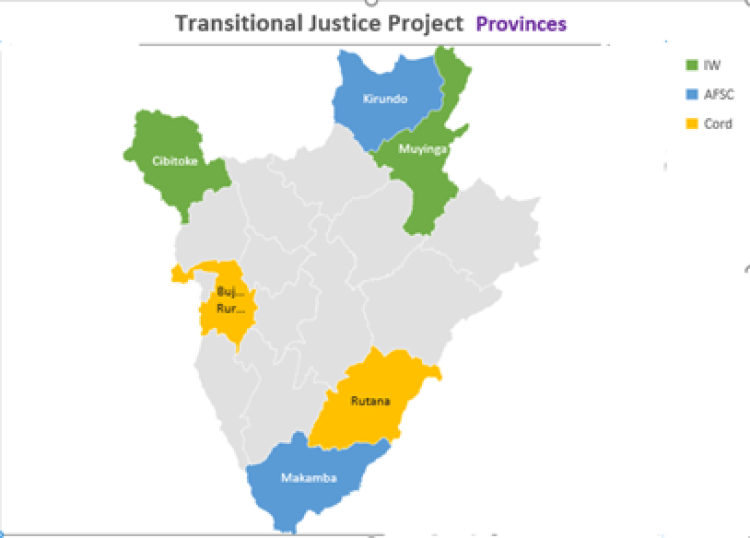
A Consortium of three International NGOs: American Friends Service Committee (AFSC), Impunity Watch (Lead) and Cord in partnership with four local organizations, Association Lumière du Monde (ALM), Association Dushirehamwe, Centre Ubuntu and Trauma Healing and Reconciliation Services (THARS) and the Ministry of National Solidarity, Social Affairs, Human Rights, and Gender is implementing a two-year project funded by European Union (2021-2023): “Dukomeze Kunywana Project”. This project also known in English as “Let’s Strengthen Reconciliation” is implemented in 18 councils of the targeted 6 Provinces of Burundi: Cibitoke, Bujumbura, Makamba, Rutana, Muyinga and Kirundo.
The population living in these six intervention provinces have experienced countless cycles of conflict and violence over many years whereby women and young people - are mostly affected and victims of fear, depression, and trauma effects. As a matter of fact, AFSC Burundi Program with its implementing partner, ALM, are organizing trainings, sensitizations, theaters, dialogues to promote Transitional Justice, thereby strengthening reconciliation, and social cohesion in Burundi.
The project targets 3,600 people (50% women), 900 youth participants in pedagogical discussions and art workshops, 600 women and girls participating in provincial dialogues, 600 people benefitting from individual psychosocial support, 360 people participating in memory healing session, 100 stakeholders, CSOs, and religious institutions.
Regarding trainings, AFSC organized a training workshop to the 36 Focal Points (24 women and 12 men) for Transitional Justice to strengthen their capacities and empower them on how to deal with the past in their respective communities.
As a result, the Focal Points of Transitional Justice conducted 26 community sensitizations and reached 6.246 people (2.709 men and 3.533 women) in the two provinces of MAKAMBA and KIRUNDO. Among them, 44 people (23 men and 21 women) were reported to have had a behavior change compared to the past.
In addition, AFSC trained 38 local authorities (31 men and 7 women) on dealing with the past throughout the project. Also 9 planned interactive theaters were organized whereby 2200 people were reached. As result, 44 people declared changing their behavior in coping with living together with other ethnic groups or members of political parties.
One of the approaches in dealing with the past is Intergenerational and community dialogues, and AFSC has used its experience and facilitated 6 Intergenerational Dialogues and reached 300 people (65 men and 78 women, 85 Young Women and 72 Young Men) and 6 Community Dialogues and reached 299 people (65 men and 70 women, 81 Young Women and 83 Young Men). In addition, 2 Provincial Dialogues were organized and reached 100 people (50 Women and 50 Young Women).
To strengthen the capacities of Civil Society Organizations of young people and women to support Transitional Justice, AFSC trained 43 representatives of those organizations from Makamba et Kirundo Provinces.
It has been one year since the start of the project and field work began after the launch of the project. A baseline study conducted gave a better trajectory through which the project relevance could be appraised. The first year has seen an impactful contribution to addressing the legacies of the past conflicts with communities that have had a perpetual quest for airing their pains and seeking justice.
AFSC’s engagement in this opportunity has contributed to transforming the lives of the communities through reconciliation and strengthening social cohesion that create a peaceful environment towards a better future of breaking the cycles of violence from generation to generation.